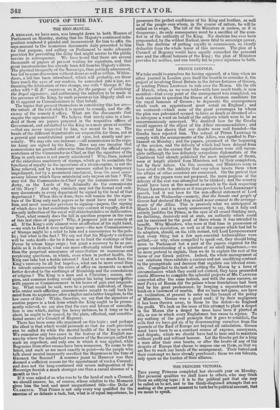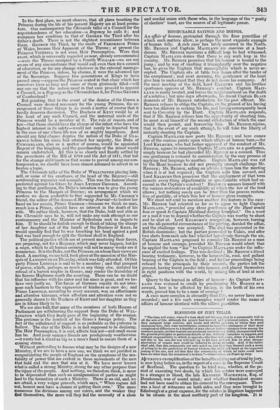THE PRINCESS VICTORIA.
THIS young Princess completed her eleventh year on Monday. Her personal qualities we shall leave to others, who may think them an edifying topic it is to the political part that she may be called on to act, and to the thinly-disguised attempts that are making at the present moment to turn her to political account, that we mean to speak In the first place, we must observe, that ail plans touching the Princess during the life of his present Majesty are at least prema- ture. Our contemporary the Chronicle talks of a Council for the superintendence of her education—a Regency he calls it ; and compares her condition to that of GEoReE the Third after his father's death. There is not the slightest resemblance between them. GEORGE the Third, by the death of FREDERICK Prince of Wales, became Heir Apparent of the Throne; at present the Princess VICTORIA is not even Heir Presumptive. Were that event, which is universally regarded as near, already consummated —were the Throne occupied by a Fourth WILLIAM—We are not aware of any circumstance that would call even then for a council of education, or for any change whatever in the external manage- ment of the Princess, unless, by chance, it were the advanced age of the Sovereign. Suppose two generations of Kings to have passed away—suppose the Princess seated in that chair which her ancestors have so long and some of them gloriously filled—will any one say that the nation must in that case proceed to appoint a Council, or a Regency as the Chronicle has it, for Prince GEORGE of Cumberland ?
But granting that in the event of the demise of the Crown a Council were deemed necessary for the young Princess, the ar- rangement of these things is so much a matter of course that it hardly deserves discussion. The Duchess of KENT would be at the head of any such Council, and the maternal uncle of the Princess would be a member of it. The rule of reason, and of law—that those should have the charge of the infant who have the highest interest in its safety—would not surely be departed from in the case of one whose life was of so mighty importance. And should any fatal chance deprive the nation of the Duke of CIA- ItENCE before his niece had attained her majority, the Duke of CUMBERLAND, also as a matter of course, would be appointed Regent of the kingdom, and the guardianship of the minor would remain undisturbed. All this is so clearly and fixedly settled by the precedents of the Bill of 1788 and the Act of 1811, that but for the strange obliviousness that seems to prevail among our con- temporaries, we should have been almost ashamed to advert to so beaten a topic. The Chronicle talks of the Duke of WELLINGTON placing him- self, or some of his creatures, at the head of the Regency—still preferred against his Grace by JOHN LYTTON CROSBIE. Accord- ing to that gentleman, the Duke's intention was to give the young Princess to the Marquis of DOURO ; an arrangement which we confess we deem preferable to that suggested by Mr. CROSBIE'S friend, the editor of the deceased Morning Journal—to bestow her hand on her cousin, Prince GEORGE—because we think no man, much less a Prince, should have an interest in the death of his wife. We rather think, however, that the Duke, bold and able as the Chronicle says he is, will not make any such attempt as our contemporary and the Minister of Sydenham seek to impute to him. If he should be foolish enough to think of taking; the charge of her daughter out of the hands of the Duchess of KENT, he would speedily find that he was knocking his head against a post that was hard enough to split the thickest skull in England. The political parties which are at present mustering their forces, are preparing, not for a Regency, which may never happen, but for a reign, which to all human seeming will not be many weeks ere it commence. It is the Duke, not the Princess, on whom their views are fixed. A meeting, we are told, took place at the mansion of the Mar- quis of LANSDOWNE on Thursday, which was fully attended. Of this party Prince LEOPOLD is said to be a member ; and that prospect of power, which, perhaps, as much as any thing else, dictated his refusal of a barren sceptre in Greece may render the friendship of his Serene Highness worth the courting. There can be no doubt that his influence with his sister and his niece is great, and we be- lieve very justly so. The forms of German royalty do not inter- pose such barriers to the expression of kindness as ours do; and Prince LEOPOLD, according to every account, was an affectionate and attentive kinsman, when affection and attention were not so generally shown to the Duchess of KENT and her daughter as they are in future likely to be. We are also told, that many of the members of both Houses of Parliament are withdrawing the support from the Duke of WEL- MINGTON which they freely gave at the beginning of the session. The pretence is the conduct of his Grace's foreign policy. The fact of the withdrawal of support is as probable as the pretence is hollow. The star of the Duke is in fact supposed to be declining. The Heir Presumptive, it is said, affects him not—and small cause has he. And your summer friends are prodigiously weathenvise —it wants but a cloud as big as a man's hand to assure them of a coming storm.
Without pretending to foresee what may be the designs of a new Ministry, if we are to have a new one, we think we are justified in congratulating the people of England on the symptoms of the mu- tability of power that are evident in these movements of the men that hold and the men that aim at it. We have never known what is called a strong Ministry, strong for any other purpose than the injury of the people. And nothing, we therefore think, is more to be deprecated than such an amalgamation of parties as might lead to the formation of such a Ministry. There is an old, and, we are afraid, a very vulgar proverb, which says, "When rogues fall out, honest men have a chance of getting their own." The more numerous the divisions among our rulers, and the weaker they 4nd themselves, the more will they feel the necessity of a close and cordial union with those who, in the language of the "purity of election" toast, are the source of all legitimate power.



























 Previous page
Previous page